News
Stop Congratulating Tinubu, Set Agenda, Cleric Advises Nigerians
An Islamic cleric and educationist, Dr Mustapha Bello, says Nigerians should stop congratulating the President-elect, Sen. Bola Tinubu, but rather set agenda for him.
Bello, a lecturer, Department of Religions and Peace Studies, Lagos State University (LASU), made the remarks at the 9th Ramadan Lecture of Anwar-Ul Islam College, Agege, Old Students’ Association (ACAOSA), last Saturday in Lagos.
The guest speaker delivered a lecture titled: “Islamic Perspective of a Good Governance: Any Lesson for Nigeria?”
Bello described the topic as apt and imperative because of the concern every discerning Nigerian now had about the state of affairs in the nation.
According to him, the nation will by May 29, experience 24 years of uninterrupted democratic rule being led by the PDP and APC, but the question is whether Nigerians have enjoyed good governance or not.
He said Nigerians could not be said to have enjoyed good governance in the light of prevailing socio-economic challenges they were faced with.
”Good governance is the responsibility of all Nigerians. Those who have been elected, we congratulate them but Nigerians should put them on their toes.
”We must set agenda for them, we must tell them what we want in terms of education, infrastructure, environment, health and others. We should not leave them, we should advise them.
”It is not enough for us to be congratulating them. Sen Bola Tinubu has emerged President-elect, and he will be inaugurated, we must set agenda for him.
”Stop doing congratulatory messages now, let us set agenda on education, environment, public morality.
“Look around, there is so much indiscipline in the society. We must also pray for them,” he said.
The cleric said that the President-elect, his deputy and all elected public office holders should be commended if they do well and criticised if they misbehave, for the nation to get good governance.
Bello said that when there is good governance, there would be peace, prosperity, plenty for everybody and less insecurity.
“The President-elect and Vice President -elect have enormous responsibility to unite our minds together. We are so divided as a people by religion, ethnicity and social classes.
“The first task before them is to find a way of assuaging our feelings and unite us; It is when we have a common objective with our mind united that we can move forward,” Bello said.
He said that good governance according to United Nations Human Rights Commission (UNHRC), relates to the political, institutional processes and outcomes that are necessary to achieve the goals of development.
Bello said the UNHRC identified transparency, responsibility, accountability, participation, and responsiveness as key attributes of good governance.
“Good governance in a layman language is the provisions of abundance of goodness by a government to its citizens which is the fundamental objective of the state as entrenched in the Nigerian constitution.
“Good governance is the major determinants of how stable, prosperous and peace a society or a country is.
“In essence, wherever you find poverty, crisis and they are on the rise, the only reason for the absence of prosperity is the absence of good governance.
“Virtually, all parametres used in measuring good governance as it relates to Nigeria is negative,” he said.
The educationist noted some policies of government have impoverished the citizens beyond imagination.
Bello said that principles of good governance in Islam include trusteeship, mutual consultation, accountability, fair dealing and justice.
He also noted that Muslims as well as adherent of other faiths were guilty in the preponderance of evil in the society.
“One of the basic requirements for good governance is justice; Every citizen should be treated on the same level. A country cannot grow where their is lopsidedness in justice system.
“We should internalise the principle in our governance; Nigeria has got into a stage that everyone must be involved in politics and governance.
“We must all change a bad situation at our own level.
Also delivering a lecture on Health Benefits of Ramadan, Alhaja Sukurat Olaniyan, a Nutrition Dietitian, noted that fasting helped in weight loss, sugar level reduction, inflammation decrease and heart cleansing.
Olaniyan urged Muslims to take enough water and relax.
She, however, counselled Muslims to pay attention to their body and obey it so as not to jeopardise their health while trying to observe the fast.
Earlier, Alhaji Lawal Pedro (SAN), the President General, ACAOSA,noted that the 9th Ramadan lecture of the college was an improvement on the previous ones.
Pedro, who described Ramadan as time for sober reflection and to get closer to God, said that the theme of the lecture had become necessary to provide a way forward in the nation’s governance system.
According to him, the country has been following the Western style of government, trying all types of governance without making sustainable progress.
He stated that the nation’s form of democracy had not delivered good governance to the people adding that there was need to take a lead from other developed countries.
“The United Arab Emirates, Saudi Arabia, Qatar and other countries are not running democracy but making progress because of Islamic perspective to governance.
“Democracy does not guarantee good governance, it is a matter of number. Leaders who emerge because they have majority votes, can only give what they have.
“In democracy, the majority will have their way, the minority which may be the most ideal will only have their say.
“That is why we are saying, is it high time we looked at Islamic perspective of good governance. We are not saying we are running the country with shari’a law or using Islamic jurisprudence,” he said.
Pedro urged government to embrace Islamic banking which frowned at interest, bribery, and corruption.
He added that ACAOSA has contributed a lot to the college in terms of provision of e-Library, infrastructure, Clinic and Solar system among others.
Alhaji Abubakr Adenle, the Chairman, ACAOSA 2023, Ramadan Planning Committee, commended the zeal of the people and their commitment to serve their alma mater.
Adenle, a retired Deputy Director, Lagos State Ministry of Agriculture, said that Ramadan was a month of forgiveness, goodness and mercies and these should continue even after the period.
He urged government across levels to implement 25 per cent UNESCO prescribed budget for education to create a pathway for sustainable development.
“We will be deceiving ourselves if the government fails to play according to the rule. We need focus on education;we need road map.
“Things do not work because we cut corners a lot in this country,” he said.
The Tide source reports that the annual lecture had in attendance various alumni of the college including Sen. Musiliu Obanikoro, a former Minister, Alhaji Tunde Balogun, former Lagos APC Chairman.
Others included civil servants, technocrats, entrepreneurs, legal practitioners among others.
The Tide source reports that the association presented prestigious Life Time Awards to some of its members for their contributions to their alma mater.
News
You Failed Nigerians, Falana Slams Power Minister
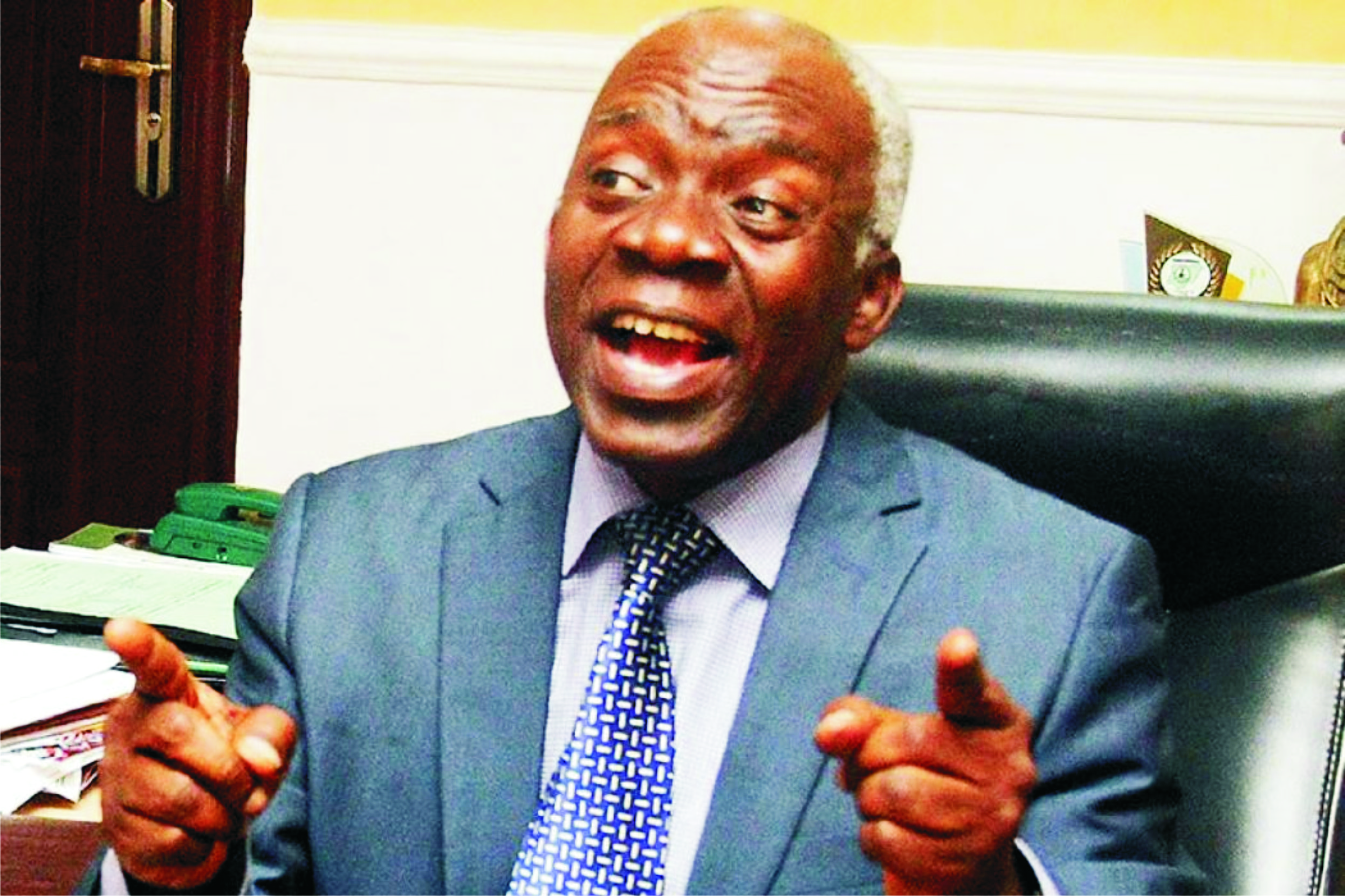
Human rights lawyer, Femi Falana, SAN, has passed a vote of ‘no confidence’ in the Federal Government, saying that the Minister of Power, Adebayo Adelabu, has failed Nigerians.
Falana was reacting to Adelabu’s appearance before the Senate to defend the increase in the electricity tariff and what Nigerians would pay on Monday.
The rights activists also claimed that the move is a policy imposed on the Nigerian government by the International Monetary Funds (IMF) and the World Bank.
Speaking on the Channels TV show on Monday night, Falana said, “The Minister of Power, Mr Adebayo Adelabu has failed to address the question of the illegality of the tariffs.
“Section 116 of the Electricity Act 2023 provides that before an increase can approved and announced, there has to be a public hearing conducted based on the request of the DISCOS to have an increase in the electricity tariffs. That was not done.
“Secondly, neither the minister nor the Nigeria Electricity Regulatory Commission has explained why the impunity that characterised the increase can be allowed.”
Falana also expressed worry over what he described as impunity on the part of the Federal Government and electricity regulatory commission.
““I have already given a notice to the commission because these guys are running Nigeria based on impunity and we can not continue like this. Whence a country claims to operate under the rule of law, all actions of the government, and all actions of individuals must comply with the provisions of relevant laws.
“Secondly, the increase was anchored on the directives of the commission that customers in Band A will have an uninterrupted electricity supply for at least 20 hours a day. That directive has been violated daily. So, on what basis can you justify the increase in the electricity tariffs”, Falana queried.
The human rights lawyer alleged that the Nigerian government is heeding an instruction given to her by the Bretton Wood institutions.
He alleged, “The Honourable Minister of Power is acting the script of the IMF and the World Bank.
“Those two agencies insisted and they continue to insist that the government of Nigeria must remove all subsidies. Fuel subsidy, electricity subsidy and what have you; all social services must be commercialised and priced beyond the reach of the majority of Nigerians.
“So, the government cannot afford to protect the interest of Nigerians where you are implementing the neoliberal policies of the Bretton Wood institutions.”
The Senior Advocate of Nigeria accused Western countries led by the United States of America of double standards.
According to him, they subsidize agriculture, energy, and fuel and offer grants and loans to indigent students while they advise the Nigerian government against doing the same for its citizens.
Following the outrage that greeted the announcement of the tariff increase, Adelabu explained that the action would not affect everyone using electricity as only Band A customers who get about 20 hours of electricity are affected by the hike.
Falana, however, insisted that neither the minister nor the National Electricity Regulatory Commission (NERC) has justified the tariff increase.
The senior lawyer said that Nigerian law gives no room for discrimination against customers by grading them in different bands.
He insisted that the government cannot ask Nigerians to pay differently for the same product even when what has been consistently served to them is darkness.
Following the outrage over the hike, Adelabu on Monday appeared at a one-day investigative hearing on the need to halt the increase in electricity tariff by eleven successor electricity distribution companies amid the biting economic situation in Nigeria.
However, Falana said that nothing will come out of the probe by the Senate.
He advised that the matter has to be taken to court so that the minister and the Attorney General of the Federation can defend the move.
News
1.4m UTME Candidates Scored Below 200 -JAMB
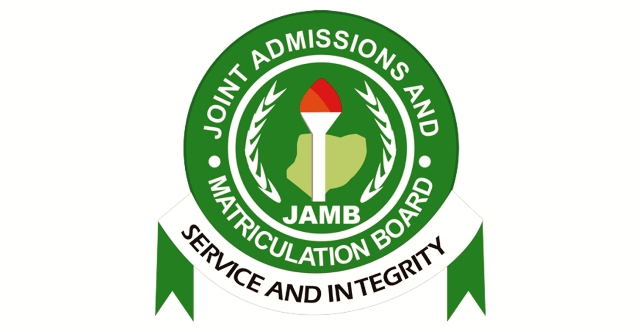
The Joint Admissions and Matriculation Board (JAMB) on Monday, released the results of the 2024 Unified Tertiary Matriculation Examination, showing that 1,402,490 candidates out of 1,842,464 failed to score 200 out of 400 marks.
The number of candidates who failed to score half of the possible marks represents 78 per cent of the candidates whose results were released by JAMB.
Giving a breakdown of the results of the 1,842,464 candidates released, the board’s Registrar, Prof. Ishaq Oloyede, noted that, “8,401 candidates scored 300 and above; 77,070 scored 250 and above; 439,974 scored 200 and above while 1,402,490 scored below 200.”
On naming the top scorers for the 2024 UTME, Oloyede said, “It is common knowledge that the Board has, at various times restated its unwillingness to publish the names of its best-performing candidates, as it considers its UTME as only a ranking examination on account of the other parameters that would constitute what would later be considered the minimum admissible score for candidates seeking admission to tertiary institutions.
“Similarly, because of the different variables adopted by respective institutions, it might be downright impossible to arrive at a single or all-encompassing set of parameters for generating a list of candidates with the highest admissible score as gaining admission remains the ultimate goal. Hence, it might be unrealistic or presumptive to say a particular candidate is the highest scorer given the fact that such a candidate may, in the final analysis, not even be admitted.
“However, owing to public demand and to avoid a repeat of the Mmesoma saga as well as provide a guide for those, who may want to award prizes to this set of high-performing candidates, the Board appeals to all concerned to always verify claims by candidates before offering such awards.”
Oloyede also noted that the results of 64,624 out of the 1,904,189, who sat the examination, were withheld by the board and would be subject to investigation.
He noted that though a total of 1,989,668 registered, a total of 80,810 candidates were absent.
“For the 2024 UTME, 1,989,668 candidates registered including those who registered at foreign centres. The Direct Entry registration is still ongoing.
“Out of a total of 1,989,668 registered candidates, 80,810 were absent. A total of 1,904,189 sat the UTME within the six days of the examination.
“The Board is today releasing the results of 1,842,464 candidates. 64,624 results are under investigation for verification, procedural investigation of candidates, Centre-based investigation and alleged examination misconduct”, he said.
Oloyede also said the Board, at the moment, conducts examination in nine foreign centres namely: Abidjan, Ivory Coast; Addis Ababa, Ethiopia; Buea, Cameroon; Cotonou, Republic of Benin; London, United Kingdom; Jeddah, Saudi Arabia; and Johannesburg, South Africa.
“The essence of this foreign component of the examination is to market our institutions to the outside world as well as ensuring that our universities reflect the universality of academic traditions, among others. The Board is, currently, fine-tuning arrangements for the conduct of the 2024 UTME in these foreign centres,” he explained.
News
Ex-CBN Director Admits Collecting $600,000 Bribe For Emefiele
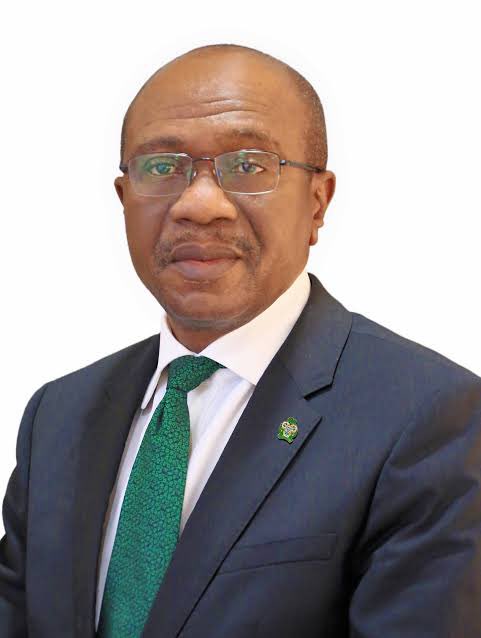
A former Director of Information Technology with the Central Bank of Nigeria, John Ayoh, has alleged that he collected on behalf of the former governor of the apex bank, Godwin Emefiele, a sum of $600,000 in two installments from contractors.
Ayoh, the second witness of the Economic and Financial Crimes Commission (EFCC), disclosed this on Monday while recounting instances where he facilitated the delivery of money to Emefiele, claiming it was for contract awards.
Under cross-examination at the Ikeja Special Offences Court in Lagos by the defence counsel, Olalekan Ojo (SAN), Ayoh admitted to facilitating the alleged bribery under pressure.
The embattled former governor of the apex bank is having many running legal battles both in Abuja and Lagos and is being tried by the EFCC at the Special Offences Court over alleged abuse of office and accepting gratification to the tune of $4.5 billion and N2.8bn.
He was arraigned on April 8, 2024, alongside his co-defendant, Henry Isioma-Omoile, on 26 counts bordering on abuse of office, accepting gratifications, corrupt demand, receiving property, and fraudulently obtaining and conferring corrupt advantage.
Emefiele’s defence, however, challenged the court’s jurisdiction over constitutional matters, urging the quashing of counts one to four and counts eight to 24 against him.
Ayoh, who was led in evidence by the EFCC prosecution counsel, Rotimi Oyedepo (SAN), said the first money he collected on Emefiele’s behalf was $400,000 which his assistant, John Adetola, came to collect at his house in Lekki, Lagos State.
He further told the court that the second bribe of $200,000 was collected at the headquarters of CBN, at the Island office.
He said the money was brought in an envelope, adding that when the delivery person, Victor, was on the bank’s premises, he contacted Emefiele, who insisted on receiving the package directly from Ayoh without involving third parties.
He said when he went to deliver the package, he saw many bank CEOs waiting to see the former apex bank governor.
When questioned if he had ever been involved in any criminal activity, he responded in the negative but admitted that he had facilitated the commission of crime unknowingly.
“I believe I did admit in my statement that I was forced to commit the crime. I don’t know the exact word I used in my statement, but I said we were all forced with tremendous pressure to bend the rules,” he said.
When asked if he opened the envelopes he collected on the two occasions and counted the money to confirm the amount, he was negative in his reply, adding that he did also write in his statement that the money was given to influence the award of contracts.
On whether the EFCC arrested him, the witness said he was invited on February 20, 2024, and returned home after he was granted bail.
Earlier, Emefiele asked the court to quash counts one to four and counts eight to 24 against him, as the court lacks the jurisdiction to try him.
Speaking through his counsel, Ojo, he said counts one to four were constitutional matters, which the court lacked the jurisdiction to determine.
In his argument, citing Sections 374 of the Administration of Criminal Justice Act and 386(2), the defence counsel told Justice Rahman Oshodi that Emefiele ought not to be arraigned before the court on constitutional grounds.
He, therefore, urged the court to resolve the objection on whether the court had the jurisdiction to try the case or not.
The second defendant’s counsel, Kazeem Gbadamosi (SAN), also relied on the submissions of Ojo.
The EFCC counsel, Oyedepo, however, objected, as he asked the court to disregard the decision of the Court of Appeal relied upon by Ojo, saying that the Court of Appeal could not set aside the decision of the Supreme Court on any matter.
Ruling on the submissions of the counsel, Justice Oshodi said he would give his decision on jurisdiction when he delivered judgment as he adjourned till May 3.
He also directed the EFCC to serve the defence proof of evidence on witness number six and his extrajudicial statement.
-
News1 day ago
NANS Threatens Nationwide Protest Over Fuel Scarcity
-
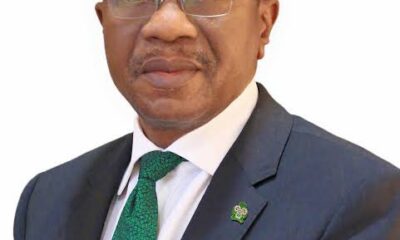
 News24 hours ago
News24 hours agoEx-CBN Director Admits Collecting $600,000 Bribe For Emefiele
-
Nation1 day ago
Ibom Developers Supports 160 Women with Skill Acquisition Training in Akwa Ibom
-

 News24 hours ago
News24 hours ago1.4m UTME Candidates Scored Below 200 -JAMB
-
News1 day ago
Gunmen Kidnap Four In Abuja
-
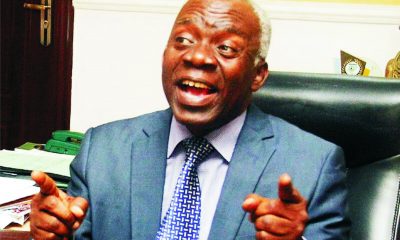
 News24 hours ago
News24 hours agoYou Failed Nigerians, Falana Slams Power Minister
-

 Nation24 hours ago
Nation24 hours agoIbom Developers Supports 160 Women with Skill Acquisition Training in Akwa Ibom
-
Niger Delta23 hours ago
Fire razes 4 shops in Edo

